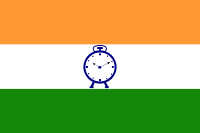Nationalist Congress Party
Nationalist Congress Party | |
|---|---|
 | |
| Abbreviation | NCP |
| President | Sharad Pawar |
| Lok Sabha leader | Supriya Sule |
| Rajya Sabha leader | Sharad Pawar |
| Founder |
Sharad Pawar P. A. Sangma Tariq Anwar |
| Founded | 25 May 1999 |
| Split from | Indian National Congress |
| Headquarters | 10, Bishmabhar Marg, New Delhi, India-110001 |
| Student wing | Nationalist Student Congress |
| Youth wing |
Nationalist Youth Congress Nationalist Yuvati Congress Rasthravadi Yuvati Congress |
| Women's wing | Nationalist Mahila Congress |
| Ideology |
Indian nationalism Civic nationalism Social Justice Social Equality Socialism Secularism[1] |
| Political position | Centre-left |
| Colours | Pacific Blue |
| ECI Status | National Party[2] |
| Alliance |
United Progressive Alliance Left Democratic Front (kerala) Left Democratic Manch, Assam |
| National convener | Sharad Pawar |
| Seats in Lok Sabha |
6 / 545 [3](currently 530 members + 1 Speaker) |
| Seats in Rajya Sabha |
4 / 245 [4]
|
| Seats in | {{ubl |
| Election symbol | |
 | |
| Website | |
|
ncp | |
The Nationalist Congress Party (NCP) is a national level political party in India.
History
The NCP was formed on 25 May 1999, by Sharad Pawar, P. A. Sangma, and Tariq Anwar after they were expelled from the Indian National Congress (INC) on 20 May 1999, for disputing the right of Italian-born Sonia Gandhi to lead the party.[5] At the time of formation of the NCP, the Indian Congress (Socialist) party merged with the new party.[6] Despite the NCP being founded on opposition to the leadership of Sonia Gandhi, it has formed coalitions with the Congress party to form a government on numerous occasions at the State level as well at the National level. On 20 June 2012, P. A. Sangma quit the NCP to contest in presidential polls.[7]
Party symbol
The Election Symbol of NCP is an analogue clock that reads 10:10.[8]
"Symbols" (PDF). eci.nic.in. 2009. The clock is drawn in blue and has two legs and an alarm button. It is situated on a tri-coloured Indian flag[9]
Ideology
According to its website, the NCP is committed to ideals of social justice, expressing support for affirmative action policies for the downtrodden members of society and for ensuring equal opportunities for all. The NCP also believes in the principle of secularism, which they define as "fraternity amongst followers of different faiths." They believe in a decentralised government structure and in upholding a society without discrimination or prejudice. However, its self-proclaimed "cardinal principle" is to "strengthen India as a sovereign, socialist, secular, and democratic republic" as well as securing "justice, liberty, equality and fraternity" among Indian citizens.
Presence in Various States
Though primarily based in the state of Maharashtra, the NCP has gradually gained prominence in states such as Andaman and Nicobar Islands, Lakshadweep, Assam, Gujarat, Bihar, Rajasthan, Andhra Pradesh, Kerala, Madhya Pradesh and West Bengal.
See also
References
- ↑ "About section at website". India: Nationalist Congress Party. 2017. Retrieved 22 April 2017.
- ↑ "List of Political Parties and Election Symbols main Notification Dated 18.01.2013" (PDF). India: Election Commission of India. 2013. Retrieved 9 May 2013.
- ↑ "Members: Lok Sabha". loksabha.nic.in. Lok Sabha Secretariat. Retrieved 19 October 2018.
- ↑ "Rajya Sabha". 164.100.47.5.
- ↑ "Sangma meets Sonia Gandhi, first time in a decade". The Times of India, 2 June 2009.
- ↑ "Spotlight: Merger with NCP". Tribune India. 1999-06-11. Retrieved 2009-05-19.
- ↑ "I have quit NCP, will contest presidential polls: PA Sangma". 29 June 2012.
- ↑ http://eci.nic.in/eci_main/ElectoralLaws/OrdersNotifications/Symbols_Sep_2009.pdf
- ↑ "Nationalist Congress Party (NCP) – Party History, Symbol, Founders, Election Results and News". www.elections.in.